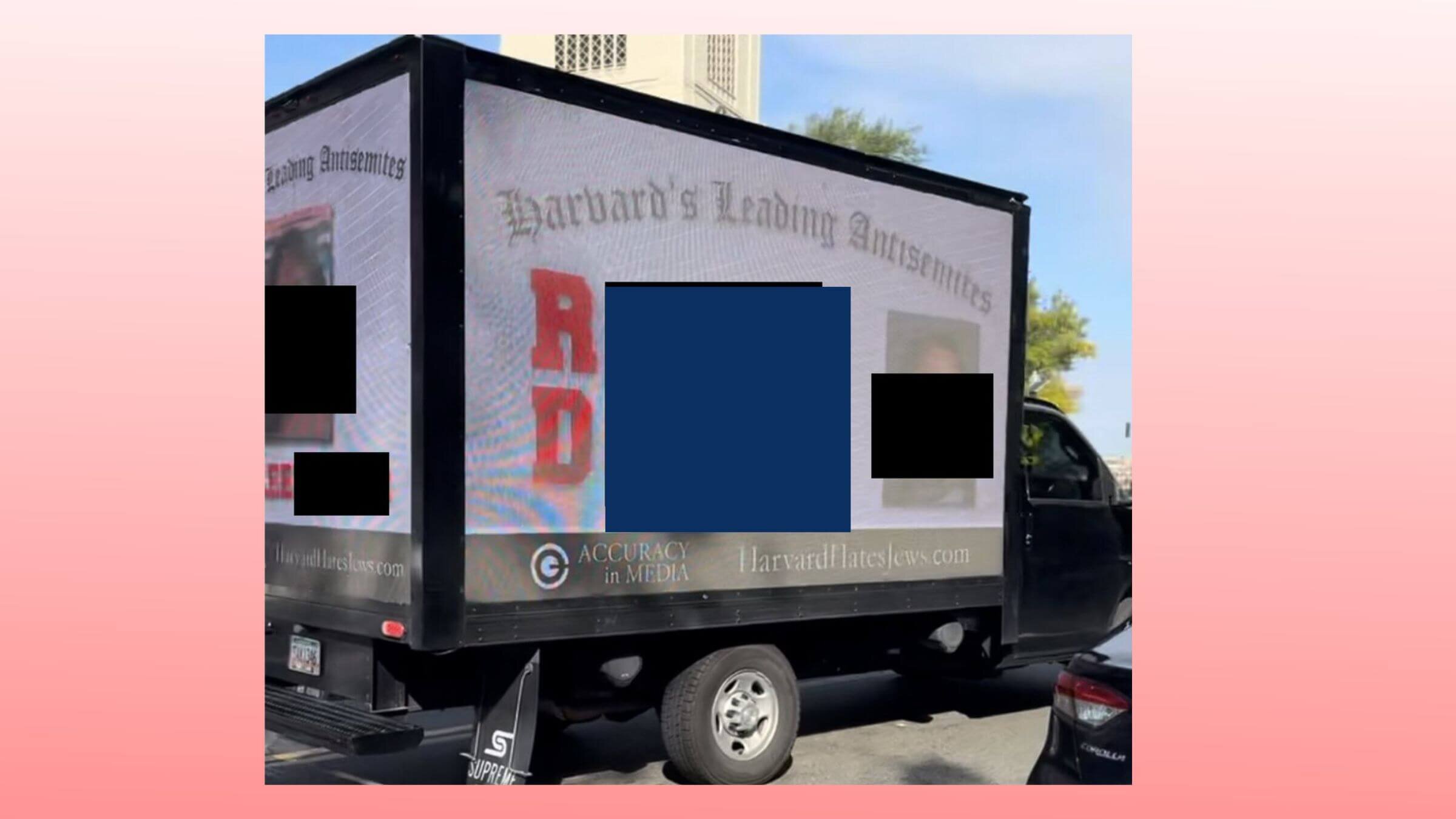I’m a Jewish Harvard student. A right-wing doxxing mob is attacking my peers
I disagree with some of my pro-Palestinian classmates, but they deserve safety, not harassment, in expressing their beliefs

A mobile-billboard truck in Harvard Square on Oct. 11, 2023, with the photos and names (redacted) of Harvard students who signed a letter saying Israel is only one to blame for recent violence. The truck says “Harvard’s Leading Antisemites.” Photo by Jason Furman
As a Jewish student at Harvard College, I’m witnessing firsthand the culture war that has broken out on campus after the Palestine Solidarity Committee and other student groups published a statement on the horrific Hamas terrorist attacks in Israel, in which they held “the Israeli regime entirely responsible for all unfolding violence.”
I was shocked and appalled that the PSC statement failed to condemn Hamas’ slaughter of 1,300 Israelis, most of whom were civilians.
But even though I strongly disagree with the PSC statement, I still believe that all students have the right to freedom of speech and — more importantly — to feel safe on campus. In recent days, powerful right-wing figures and organizations (led by hedge fund billionaire Bill Ackman and the ironically named Accuracy in Media newsgroup) have whipped up a hateful mob against hundreds of Harvard students in a series of vicious doxxing attacks.
On Oct. 10, Ackman (who has 850,000 followers on Twitter) tweeted that Harvard should “release a list of the members of each of the Harvard organizations that have issued the letter … so as to insure that none of us inadvertently hire any of their members.” This was a clear dog whistle to Ackman’s followers to dox and harass the students. On cue, immediately after Ackman’s tweet multiple right-wing websites launched a doxxing campaign, posting the names and personal information of students allegedly associated with organizations that signed the PSC statement.
Some of the students listed online as members of these organizations have never even attended a club meeting, much less personally endorsed this statement. A friend of mine is in this exact predicament and is scared that they will have trouble getting hired after being doxxed, despite having nothing to do with the statement.
Earlier this week, on Oct. 11, the harassment escalated further: Two mobile-billboard trucks funded by Accuracy in Media started driving around Harvard Square, displaying the words “Harvard’s Leading Antisemites” and the names and photos of students connected to the PSC’s statement. On Oct. 12, the cover of the New York Post featured a group shot of PSC members. The trucks, the online doxxing campaign and the Post cover function as billboards for hate, encouraging violence against these students.
These doxxing attacks have not only endangered the students whose organizations signed the letter, but also have created immense fear and danger for the whole Harvard Muslim community. This week I’ve read dozens of messages on Sidechat (an anonymous chat app used by Harvard students) from my Muslim peers who said they felt unsafe on campus:
- “As a Muslim who had nothing to do with the PSC statement, I feel very unsafe walking to my class and back.”
- “I’ve always heard my mother’s stories about what it was like for her living in America right after 9/11. To experience her fear first-hand is something I never thought I’d ever have to experience : ( I’m so scared to go out.”
- “Is it going to take a student being attacked for the administration to do anything to protect us?”
Ackman is a self-proclaimed “huge free speech advocate.” But isn’t the truest test of free speech adherence protecting the rights of someone who says something you find disgusting? Instead, Ackman targeted these students with a hateful mob.
As I’ve sat in class this week, unable to focus as I think about Israeli girls my age being raped and murdered, I’ve felt deeply hurt that some of my peers signed a statement justifying this violence. I was also disappointed by the Harvard administration’s tepid initial response to the attacks on Oct. 9. Yet I still feel that free speech matters because it is a fundamental pillar of our American democracy — the first right granted to us in the Bill of Rights. If we silence ideas that we disagree with, we risk slipping into authoritarian censorship.
Freedom of speech forms the bedrock of higher educational institutions like Harvard. The free exchange of ideas — even those that are offensive or misguided — is crucial for student learning and growth.
This doxxing is not just a free speech issue, but is actively endangering my peers. I don’t see how it’s possible that Ackman didn’t know exactly what could happen. Students on campus, especially those with personal ties to Israel and Palestine, have been traumatized by the events of this week; Ackman’s actions do not make this painful moment safer for my Palestinian, Jewish, and Israeli peers. I call on him to engage with his followers directly and tell them to stand down. He must stop targeting kids and remove the mobile-billboard trucks from our campus.
The violence in Israel has been immensely divisive on campus, especially between the Muslim and Jewish communities. But while we may be deeply politically divided, I would urge my Harvard classmates to find that we can agree on one thing: All students deserve to feel safe.
I hope we can come to a consensus that everyone — from the person with the exact same views as us, to the person with whom we disagree the most — can walk to class without fear. We must collectively condemn these doxxing attacks which put Harvard students at risk and continue to support one another amidst the ongoing grief.
To contact the author, email [email protected].
A message from our Publisher & CEO Rachel Fishman Feddersen

I hope you appreciated this article. Before you go, I’d like to ask you to please support the Forward’s award-winning, nonprofit journalism so that we can be prepared for whatever news 2025 brings.
At a time when other newsrooms are closing or cutting back, the Forward has removed its paywall and invested additional resources to report on the ground from Israel and around the U.S. on the impact of the war, rising antisemitism and polarized discourse.
Readers like you make it all possible. Support our work by becoming a Forward Member and connect with our journalism and your community.
— Rachel Fishman Feddersen, Publisher and CEO






















